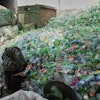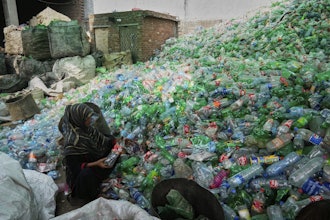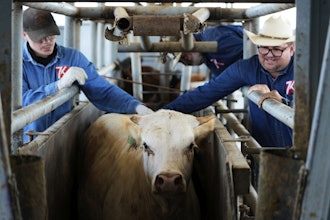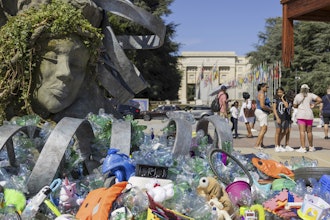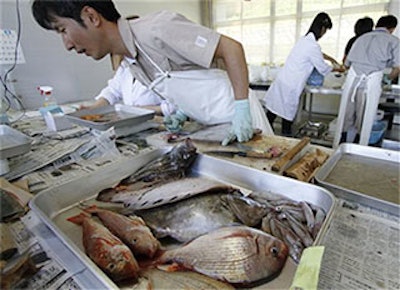
IWAKI, Japan (AP) — Japan's industry minister pledged urgent government action Monday to curb leaks of radioactive water from the crippled Fukushima Dai-Ichi nuclear plant.
 |
| A laboratory worker at Fukushima Prefecture Fisheries Research Center dissects fish caught earlier in the day by local fishermen, before conducting radiation tests in Iwaki, about 40 kilometers (25 miles) south of the tsunami-crippled Fukushima Dai-ichi nuclear power plant, Monday, Aug. 26, 2013. Fourteen fishing boats at a port in the city were recruited by Fukushima Prefecture to conduct once-a-week fishing expeditions in rotation to measure radiation levels of fish caught in the waters off Fukushima. Fishermen in the Iwaki fishing ports had hoped to resume test catches in September following favorable sampling results after two years of the disaster. But those plans have now been scrapped after the recent news of radiation contaminated water leak from storage tanks at the nuclear power plant. (AP Photo/Koji Ueda) |
Toshimitsu Motegi told reporters that lax maintenance by the plant's operator was largely to blame for the series of leaks from storage tanks at the plant, which was damaged by a massive earthquake and tsunami in 2011.
"The urgency of the situation is very high," Motegi said. "From here on the government will take charge."
The leaks have shaken confidence in the reliability of about 1,000 tanks that are crucial for storing water that has been pumped into three damaged reactors to keep their radioactive fuel cool.
At least five of the tanks at the plant on Japan's northeastern coast have leaked.
Last week, the plant's operator, Tokyo Electric Power Co., said 300 tons (300,000 liters, 80,000 gallons) of highly contaminated water had flowed from one tank, in the worst leak so far. Most of the water is thought to have seeped into the ground, but some may have entered the sea through a rainwater gutter, it said.
The tanks contain nearly 300,000 tons (300 million liters, 80 million gallons) of partially treated radioactive water.
Motegi, who toured the plant on Monday, said inspections of the tanks would be doubled to four times a day. "Water control is a very important issue. We have to prevent contaminated water from reaching the sea," he said.
TEPCO President Naomi Hirose, who accompanied Motegi, apologized for the leaks. He said the company is setting up a new taskforce to better deal with the problem of radioactive water and will step up efforts to assess the extent of underground water contamination and prevent leakage into the sea.
TEPCO plans to build more tanks to store another 800,000 tons of water, which combined with plans to pump out uncontaminated underground water should prevent the situation from becoming dire for another three to four years.
"But we cannot keep making tanks endlessly," Hirose said.
The chief of Japan's nuclear watchdog, Toyoshi Fuketa, who inspected the plant last Friday, also criticized the plant's management of the tanks, some of which have hoses running directly on the ground.
TEPCO spokesman Noriyuki Imaizumi said Saturday that a two-person team has been inspecting the 1,000 tanks during twice-daily "patrols," which regulators have criticized as just a walk. He acknowledged that the workers usually did not carry dosimeters to measure radioactivity, and did not keep full inspection records unless there were notable irregularities such as major rust spots or leaks.
Chief Cabinet Secretary Yoshihide Suga said the recent major leak was "extremely regrettable," though he said it arose "largely because of sloppy valve operation and patrols," apparently trying to calm deepening fears of additional leaks.
"Our position is to do everything we can to help resolve the problem as quickly as possible," he said.
Motegi is expected to compile a support plan, and the ruling coalition will set up a taskforce to handle the water problem, Suga said.
As the crisis drags on, costs are mounting.
TEPCO's stock price plunged nearly 6.9 percent on Monday following the release over the weekend of further details of the crisis.
Fishermen working from a port in the nearby city of Iwaki had hoped to resume test catches next month after sampling showed a decline in radioactivity over the past two years. But those plans were scrapped, and fisheries operations in Fukushima remained suspended indefinitely, after news of the latest leak from the plant.
It remains unclear what the environmental impact from the contamination will be on sea life, but the frustrations of those who rely on the fisheries industry for their livelihood is evident.
"The operators (of the plant) are reacting too late every time in whatever they do," said Fumio Suzuki, whose boat has been part of the sampling trips since the 2011 disaster.
"People in the fishing business have no choice but to give up. There are many (fishermen) who have mostly given up already," Suzuki added.
Still, fisherman and researchers continue to survey the sea life.
Sampling results from over 170 types of fish showed 40 percent of fish with signs of contamination.
Nobuyuki Hatta, director of the Fukushima Prefecture Fisheries Research Center, said the trend had been positive before the latest leaks, with fewer fish found exceeding radiation limits.
___
Associated Press writers Elaine Kurtenbach and Mari Yamaguchi in Tokyo contributed to this report.


